by Ali
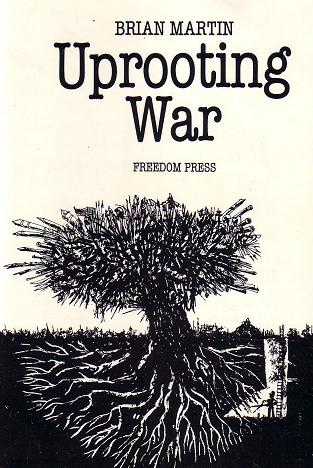
Dustwrapper art courtesy www.bmartin.cc
Editor’s Preface: This interview was conducted by email in 2006. “Ali” is an Iranian blogger and rights activist. His Persian language site can be found at lanternblog.com. As he states in the questions below, his site is censored and the last entry is dated January 2007. Please consult the notes at the end for further information. JG
Ali: Let me start with the basics and as the first question ask you as a thinker and writer on nonviolent movements to give us your definition of nonviolence?
Brian Martin: Nonviolent action includes methods such as petitions, rallies, boycotts, strikes, sit-ins, fasts and setting up alternative political structures. It’s often more informative to give examples of nonviolent action than present a formal definition. These and other such methods avoid physical violence against others, though nonviolent activists themselves may be assaulted or arrested. Nonviolent action is action that goes beyond conventional politics, so it doesn’t include lobbying or voting. Nonviolence can also be something broader, including personal behaviour that avoids oppression and efforts to promote ways of living together that are based on freedom, justice, equality and ecological sustainability.
Ali: I know that you are originally a physicist. As I’m in the field of natural science myself, the next question I ‘d like to ask is how you got into nonviolence research and studies? Can you please explain your starting ambitions for research and studies in this field?
Read the rest of this article »
by Jess Clarke

Homeless in America; image courtesy web.stanford.edu
Interviewer’s Preface: Street Spirit is one of the longest-lived publications on poverty, homelessness and human rights in the United States; it is sold by homeless vendors in Oakland and Berkeley, California, and tirelessly defends the human rights of homeless people. Terry Messman produced the first issue in March 1995, and has edited and designed every issue for nearly 22 years. Please see the note at the end for further biographical details about Messman, and interviewer Jess Clarke. JC
“What matters in the long run is staying true to the cause of justice. In the end,
that is the very meaning of our lives — whether we keep going, and keep working for peace and justice,
or give up in despair. It’s the question at the very heart of it all.” Terry Messman
Jess Clarke: As the founder of Street Spirit, you’ve seen some of the important political trends in homeless organizing and human rights advocacy in the Bay Area. Looking at the big picture, when and why did you first found Street Spirit?
Terry Messman: We put out the first issue in March of 1995, so we’ve been going steadily nearly 22 years. It’s one of the longest-lived media of any kind in the nation to document the history of poverty, homelessness, and the movements to overcome economic injustice.
Read the rest of this article »
by David Barsamian
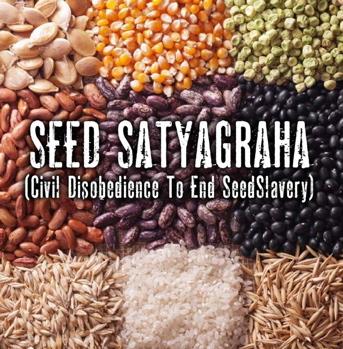
Seed Satyagraha poster courtesy navdanya.org
Interviewer’s Preface: Vandana Shiva is an internationally renowned voice for sustainable development and social justice. She spoke in New Delhi with David Barsamian, founder of Alternative Radio, during his December 2008 trip to India and Pakistan. Some say terrorism makes Gandhi irrelevant. Vandana Shiva, farmer, seed saver, and global justice activist, says we need him more than ever. Gandhi’s three pillars of freedom are now the keys to our survival. Here then are her thoughts on why Gandhi’s philosophy is still relevant—even in a world where terrorism is on the rise. Please consult the Editor’s Note at the end for biographical information about Vandana Shiva and David Barsamian. DB
David Barsamian: In the wake of the attacks on Mumbai in late November 2008, there was a piece in the (London) Sunday Express, “The Irony Gandhism Presents in Today’s Terror-Infested India.” The writer said, “It is time the government became doubly stern about its steps to combat terrorism. India may be the land of Mahatma Gandhi, but today’s situation warrants crude and cunning ways to counter extremism. That alone can ensure peace, harmony, and joy in the country.” Would you share your thoughts on this?
Vandana Shiva: Unfortunately, “crude” means of dealing with violence and terror just breed more violence and terror. As we saw after 9/11, the war on terror has created more terrorists. I think anyone who says that Gandhi is irrelevant in today’s world doesn’t understand either terrorism, its roots, or Gandhi. Suicide bombers don’t get created out of the blue; they are created as a result of decisions, systems, and processes. It’s very much like weeds in a field. One way to control weeds is by spraying Round-Up pesticides, but then you get Round-Up-resistant weeds, which are even stronger than the original weeds. That’s what is happening with terrorism.
Read the rest of this article »
by Chris Walters
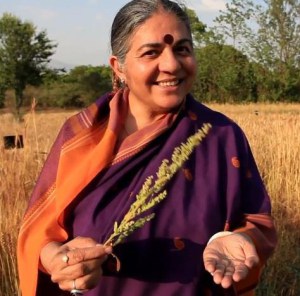
Photograph of Vandana Shiva courtesy ecofarmingdaily.com
Acres U.S.A.: How should we approach the story of Indian agriculture?
Vandana Shiva: The first thing you need to remember is that India is a land which has been farmed for 10,000 years continuously and sustains more than a billion people on its agriculture. India is the land where the British were the rulers, and in 1891 they sent John Augustus Voelcker to make a survey. He wrote a report on Indian agriculture that was published two years later. He said he could find more ways that Indian farmers could advise Great Britain about how to improve its farming than ways the British could advise India. He wrote that Indian agriculture was not backward, and that in many areas there was little or no room for improvement. Then the imperial British government sent Albert Howard to India in 1905. He arrived to find the fields were fertile. He found no pests damaging the crops, and he decided to make the study of peasant agriculture his profession. The agricultural testament that resulted from his studies became the basis of the organic movement worldwide — the Soil Association in the U.K., Rodale in the United States, all of them came out of Howard’s information, and Howard’s inspiration was ancient Indian agriculture. He so clearly distinguished between, as he said, the agriculture of the Occidental world and the agriculture of the Orient.
Read the rest of this article »
by Terry Messman

Album cover art courtesy allmusic.com
“We’re still struggling as a species with how we can stop war. The families (of Vietnam veterans) were so grateful that anybody would acknowledge their sacrifice. And I don’t mean sacrifice in a clichéd way. The war had reached out and struck their family in a horrible, terrible way.” Country Joe McDonald
Street Spirit: You have been deeply involved in supporting military veterans, but there’s a saying that no good deed goes unpunished. Did Bill O’Reilly of Fox News actually compare you to Fidel Castro because you organized a Veteran’s Day event in 2005 that involved the Gold Star Families for Peace?
Country Joe McDonald: Yeah, he did that! He did say that! He said on his show that me doing a Veteran’s Day event in Berkeley was like having Fidel Castro in charge of it, after we got publicity because we wanted to have a Gold Star father speak in one of our Veteran’s Day events.
Read the rest of this article »
by Terry Messman
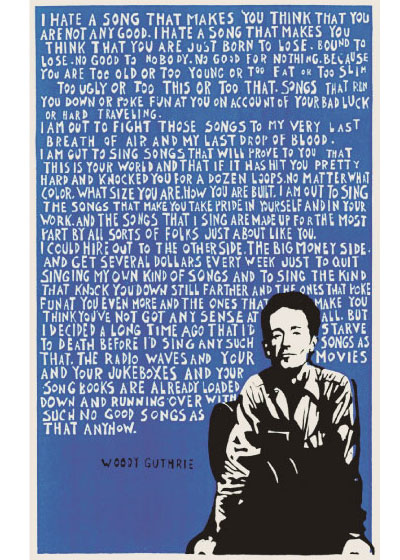
Woody Guthrie poster courtesy countryjoe.com
“I knew a lot of the people had to escape or they were killed by the junta in Chile. It was just tragic and terrible. I had grown up with a full knowledge of the viciousness of imperialism from my socialist parents. So I knew that, but I was still shocked.” Country Joe McDonald
Street Spirit: Robert W. Service called his poems about war “songs from the slaughter mill.” How did it happen that an acid-rock musician of the Vietnam era transformed poems written about World War I into a powerful musical statement in your album War War War?
Country Joe McDonald: When I got out of the Navy and was going to Los Angeles State College, I got a job working in East L.A. at a breaded fish factory. When I was coming home from work, I stopped at a used bookstore, and I saw a book called Rhymes of a Red Cross Man. I took it home and read the poems by Robert W. Service. His brother was killed in World War I and he himself was a Red Cross man during the war — a stretcher-bearer and ambulance driver. I knew about his frivolous, entertaining poems set in the Yukon, like “The Cremation of Sam McGee.” But I was really struck by his poems about war; they’re very different. I just thought they were great.
Spirit: Why were his poems so meaningful to you?
McDonald: They were poignant or humorous poems that were approaching war from different points of view. I just liked them and I thought they were really good. And I liked the little watercolor paintings that illustrated it. One particular poem, “The Ballad of Jean Desprez,” really affected me.
Read the rest of this article »
by Terry Messman
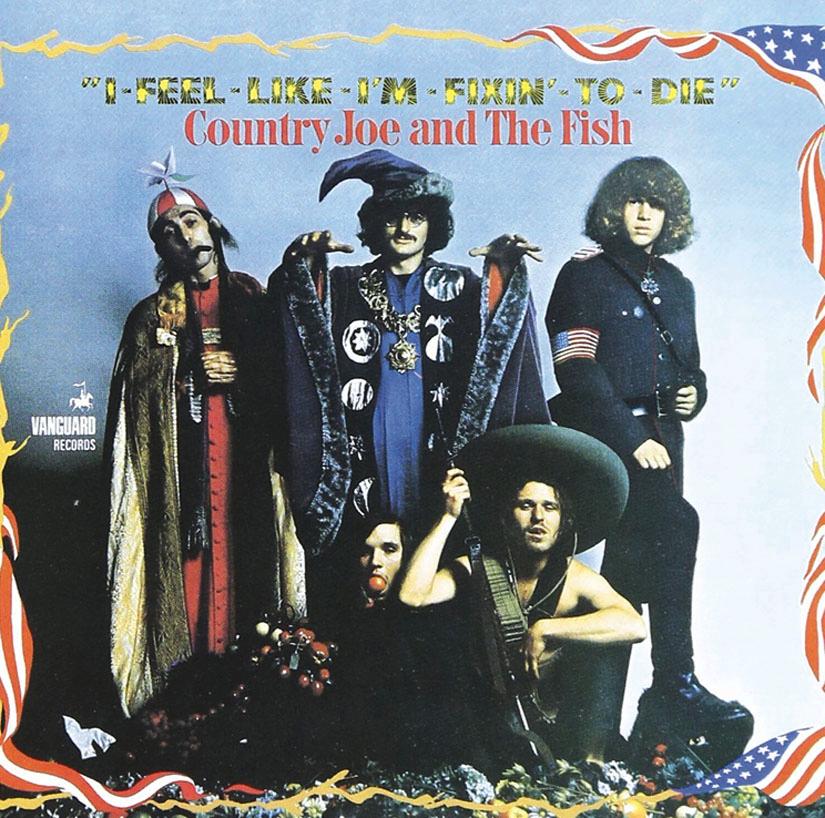
The second album Country Joe and the Fish album; Country Joe is seated front far right; courtesy thestreetspirit.org
“Women coming home from the Vietnam War never were the same after their wartime experiences. They were shoved into a horrific, unbelievable experience. That’s what I wrote about in the song: ‘A vision of the wounded screams inside her brain, and the girl next door will never be the same.’” Country Joe McDonald
Street Spirit: You first sang “I Feel Like I’m Fixin’ to Die Rag” on the streets of Berkeley during the Vietnam War in 1965. Fifty years later, you sang it at an anti-nuclear protest at Livermore Laboratory on the 70th anniversary of the atomic bombing of Hiroshima. Could you have imagined in 1965 that your song would still have so much meaning today?
Country Joe McDonald: Actually, I find the concept of 50 years incomprehensible. But it’s indisputable because I have children and some of those children have children and I know that the math is right. And I just finished an album and the title of it is 50 because it’s 50 years since the first album. It’s called Goodbye Blues. I didn’t die, so there you are. I’m still alive and I’m still doing something. Filling a need helps a lot, and it keeps me sane.
Read the rest of this article »
by Terry Messman

Country Joe McDonald sings “Fixin’ to Die Rag” for 300,000 people at Woodstock; photo by Jim Marshall, courtesy thestreetspirit.org
“It was magical. All at the same time, amazing stuff happened in Paris, London, and San Francisco — and BOOM! Everybody agreed on the same premise: peace and love. It was a moment of peace and love. It was a wonderful thing to happen. And I’m still a hippie: peace and love!” Country Joe McDonald
Street Spirit: During the Vietnam War, and while caring for the victims of PTSD and Agent Orange in the years after the war, Lynda Van Devanter and other Vietnam combat nurses helped many veterans to survive. Your song about Van Devanter says that the combat nurse is everybody’s savior but her own. Then it asks, “Who will save her now?”
Country Joe McDonald: Yes, who will save her now?
Read the rest of this article »
by Rev. Nichiko Niwano
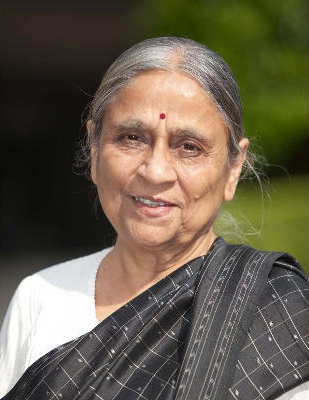
Portrait of Ela Ramesh Bhatt courtesy www.npf.or.jp/english
Editor’s Preface: This interview was conducted upon the award of the 2010 Niwano Peace Prize to Ela Ramesh Bhatt, founder of the Self-Employed Women’s Association (SEWA), an Indian women’s labor union with more than 1.2 million members. She was cited for having worked for “more than thirty years to improve the lives of the poorest and most oppressed women workers.” Rev. Nichiko Niwano is president of the Niwano Peace Foundation in Tokyo, which manages the prize. Please consult the note at the end for further biographical information, acknowledgments, and links. JG
Niwano: I have been particularly impressed by the fact that your activities promoting self-reliance for female workers are based on the spirit of nonviolence. Efforts for social reform always arouse opposition. If we look at history, there have been a great many confrontations wherein “blood washes blood” in cycles of violence. At present, violence swirls around the world. I think that within this context, your work clears a new pathway to the future. Furthermore, you do not view women simply as “the weaker sex”. You have said that “women are the key to the formation of society” and that “women must become the leaders of social change”. These are extremely important messages as we consider the future. Although I am meeting you for the first time, I have very much looked forward to having this dialogue with you, and it is a great pleasure to greet you.
Bhatt: First of all, thank you very much, and I’m really very pleased and grateful that the Niwano Peace Prize of Japan has recognized the courage and the hard work of my SEWA sisters in India. They are trying to build a peaceful society based on constructive work. Personally, the prize is humbling, and makes me more conscious of the immensity of the challenges before us. I realize that life is short and art is long.
Read the rest of this article »
by Terry Messman
“The feminism that I believe in is a defense of all life. Not only women, not only the earth, but all together. It’s all reweaving the web.” Shelley Douglass
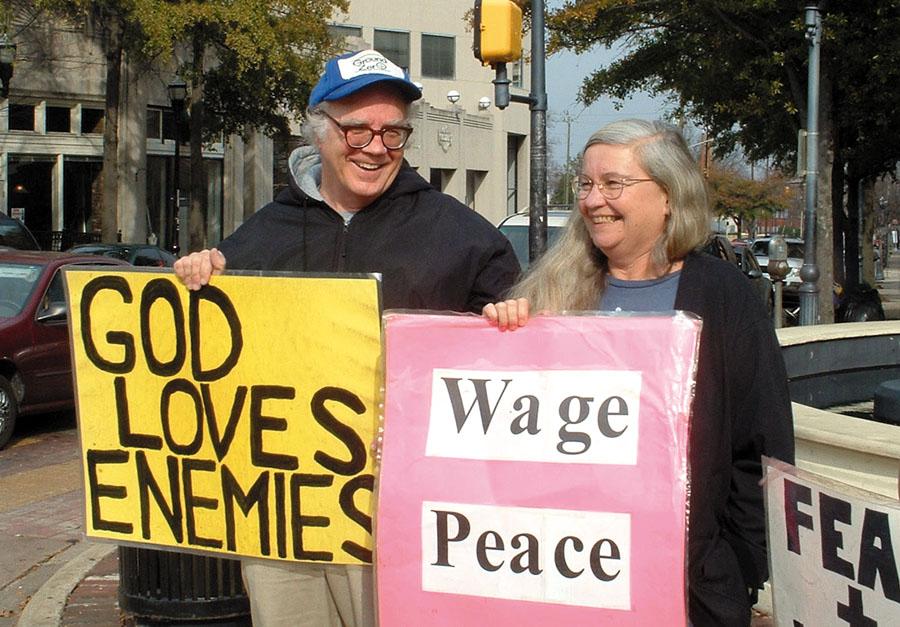
Jim and Shelley Douglass demonstrating for peace in Birmingham, Alabama.
Street Spirit: Concern for the rights of women, both in society and in the peace movement, was always a part of Ground Zero’s message to the larger movement. Can you describe how feminism and women’s issues became interwoven with Ground Zero’s peace work?
Shelley Douglass: Well, you have to remember that Ground Zero — and Pacific Life Community, which preceded it — were founded on the idea that nonviolence was a way of life. So it wasn’t just a political type of resistance campaign against Trident. It was an attempt, and is an attempt, to learn a new way of living where things like Trident are not necessary any more. In order to do that, you have to have justice, because the point of the weaponry is to defend things that are unjust or structures that are unjust. So equal rights for women was part of the basis of what we were doing.
Read the rest of this article »














